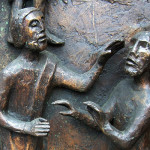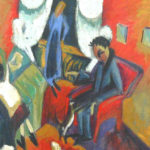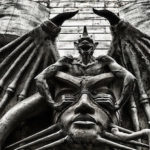We run our website the way we wished the whole internet worked: we provide high quality original content with no ads. We are funded solely by your direct support. Please consider supporting this project.

The Universal Experience of the “Spiritual”
Humans have from prehistoric times generally assumed the reality of spirits who transcend our physical existence. Outside of post-Enlightenment western intellectual culture the belief in spirits is almost universal. Whether conceptualized as spirits of nature or as power animals (as in primordial cultures), as helpful malã’ika or malicious Jinn (Islam) or as guardian angels or sinister demons (in Christianity), a belief in the reality of good and evil spirits has been one of the most pervasive commonalties of human culture throughout history.
Most frequently, and certainly in its most ancient forms, the belief in spirits was combined with a belief in a highest god, and many times with a belief in a single Creator. Moreover, there has almost always been an awareness that these spirits can influence human affairs, for better or for worse, and that there is on some level conflict among these spirits which affects human life. In short, most cultures throughout history have in one form or another embraced some version of the warfare worldview.
It is difficult to adequately account for the universality of this belief and the remarkable commonalties which are found amidst otherwise disparate cultures regarding the contents of this belief unless we suppose that these different cultures are intuiting and experiencing something real. This doesn’t of course prove that the spirits are real. But it does show that, barring any convincing evidence to the contrary, the belief that spirits are real is rational, the protestations of secularized western academics not withstanding.
Indeed, in most cultures this belief in spirits has not only been something people held to but something they experienced. In addition, we must take into account the fact that throughout history and continuing on in our day many people have experienced what they interpret to be a spirit presence. Such experiences are not limited to any particular culture or any particular time period: they occur in many different places, to many different people, at many different times.
What are we to make of this? We must of course allow ample room for the possibility of ulterior motives in making such claims as well as for perfectly natural explanations for some of these experiences. It is, for example, undoubtedly true that some people simply fabricate angelic or demonic stories for attention, monetary gain or religious prestige—especially in our culture that in some quarters rewards individuals making such claims. Others who claim such experiences are without question psychologically or emotionally imbalanced. Still others may be sane enough and lack an ulterior motive but are simply mistaken in their interpretation of what they experienced. Perhaps they had a waking dream or a stress-related hallucination. In any event, such possibilities must certainly be critically considered as we examine each particular account provided by people who claim to have experienced a spiritual presence.
But surely it is unwarranted to assume that all such accounts can be explained away. If we take the time to examine these accounts we find that at least some of them are recounted by individuals whose motives are beyond reproach and whose psychological and emotional stability is beyond question. And many of them do not leave room for an easy natural explanation.
Since most of the world’s population throughout history has claimed to see something which certain western intellectuals are unable to see, perhaps it is the spiritual vision of secularized westerners that is faulty, not the perception of the rest of the world. Unless we arbitrarily and irrationally decide to dismiss all such accounts simply because they don’t conform to our presupposed ideas about things, such testimonies provide good evidence that spirits are real. At the very least, the evidence from history and from cultures outside the West should expose the arbitrariness and narrowness of those who simply assume that things like angels, demons and the Devil amount to nothing more than pieces of an ancient superstitious mindset.
Photo credit: Ramesh Vedula via Unsplash
Category: General
Tags: Angels, Demons, Warfare Worldview
Topics: Spiritual Warfare, Cosmic Conflict
Related Reading

Why Doesn’t God Heal When We Ask?
If we are called to manifest what Jesus manifested and revolt against what Jesus revolted against, and Jesus carried out the kingdom through healing, then why doesn’t God heal those we pray for? One of my personal kingdom heroes is a Vietnamese lady named Dr. Huyen Tranberg. She is a medical doctor who works with…

A Visit to Auschwitz
Ever since I first learned of the full horror of the Holocaust when I was a freshman at the University of Minnesota I have had a kind of obsessive fascination with it. I’ve studied every aspect of Hitler and the Third Reich and about the philosophy that led to their “Final Solution.” In fact, for…

What does the Bible mean when it says God “sent an evil spirit” on certain people?
Question: In Judges 9:23, I Samuel 16:15ff and 18:10 it is said that God sends evil spirits on people. Doesn’t this support the idea that everything Satan and demons do is under God’s sovereign control? Answer: I’ll make six points in response to this question. 1) If everything Satan and demons do is under “God’s…

Who Needs to Pray and Fast? (podcast)
Greg puts a bow on our shortest episode ever. Episode 634 http://traffic.libsyn.com/askgregboyd/Episode_0634.mp3

Does God Intervene?
The Open View of the future recognizes the vast influence of all the angelic and human wills God created, which, in turn, influences the various outcomes and circumstances in life. Therefore life is arbitrary because of the way the decisions made by an unfathomably vast multitude of free agents intersect with each other. How life…

The Cosmic Scope of Spiritual Warfare
Yesterday’s post briefly introduced the reality that we live in the midst of spiritual warfare. This is the reality of being a part of creation where Satan prowls like a roaring lion (1 Pet 5:8-9). The Scriptures make it clear that all of creation is in need of redemption. While most Christians assume that the…
